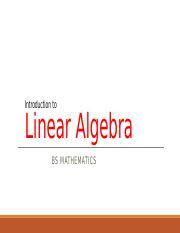Linear algebra is a fundamental area of mathematics that deals with the study of linear equations, vector spaces, and linear transformations. It is a crucial subject that has numerous applications in various fields such as physics, engineering, computer science, and data analysis. Mastering linear algebra can seem daunting, but with a step-by-step approach, you can become proficient in this subject.
Step 1: Understand the Basics of Linear Algebra

To start with linear algebra, you need to understand the basic concepts such as vectors, matrices, and operations like addition and multiplication. You should also be familiar with the different types of matrices like square matrices, diagonal matrices, and invertible matrices. Understanding the basics of linear algebra will provide a solid foundation for further learning.
Key Concepts to Focus On:
- Vector operations (addition, scalar multiplication)
- Matrix operations (addition, multiplication)
- Types of matrices (square, diagonal, invertible)
- Determinants and inverses
Step 2: Learn Linear Transformations and Vector Spaces

Linear transformations and vector spaces are the building blocks of linear algebra. You should understand how linear transformations can be represented by matrices and how vector spaces can be used to solve systems of linear equations. You should also learn about the different types of vector spaces like null spaces, column spaces, and row spaces.
Key Concepts to Focus On:
- Linear transformations and their representations as matrices
- Vector spaces (null spaces, column spaces, row spaces)
- Basis and dimension of a vector space
Step 3: Practice Solving Systems of Linear Equations

Solving systems of linear equations is a crucial application of linear algebra. You should practice solving systems of linear equations using different methods like Gaussian elimination, LU decomposition, and Cramer's rule. You should also learn how to use matrices to solve systems of linear equations.
Key Concepts to Focus On:
- Gaussian elimination
- LU decomposition
- Cramer's rule
- Using matrices to solve systems of linear equations
Step 4: Learn Eigenvalues and Eigenvectors

Eigenvalues and eigenvectors are important concepts in linear algebra that have numerous applications in various fields. You should learn how to find eigenvalues and eigenvectors of a matrix and how to use them to solve systems of linear differential equations.
Key Concepts to Focus On:
- Finding eigenvalues and eigenvectors of a matrix
- Using eigenvalues and eigenvectors to solve systems of linear differential equations
Step 5: Apply Linear Algebra to Real-World Problems

Linear algebra has numerous applications in various fields like physics, engineering, computer science, and data analysis. You should practice applying linear algebra to real-world problems like image and signal processing, data compression, and machine learning.
Key Concepts to Focus On:
- Image and signal processing
- Data compression
- Machine learning
- Markov chains and random processes
By following these five steps, you can master linear algebra and its applications. Remember to practice regularly and apply linear algebra to real-world problems to reinforce your understanding.






What is linear algebra?
+Linear algebra is a branch of mathematics that deals with the study of linear equations, vector spaces, and linear transformations.
Why is linear algebra important?
+Linear algebra is important because it has numerous applications in various fields like physics, engineering, computer science, and data analysis.
How can I learn linear algebra?
+You can learn linear algebra by following the five steps outlined in this article: understanding the basics, learning linear transformations and vector spaces, practicing solving systems of linear equations, learning eigenvalues and eigenvectors, and applying linear algebra to real-world problems.
We hope this article has provided you with a comprehensive guide to mastering linear algebra with applications. Remember to practice regularly and apply linear algebra to real-world problems to reinforce your understanding.
